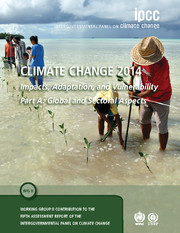 Climate Change 2014 – Impacts, Adaptation and Vulnerability: Part A: Global and Sectoral Aspects
Climate Change 2014 – Impacts, Adaptation and Vulnerability: Part A: Global and Sectoral Aspects Published online by Cambridge University Press: 05 January 2015
16.1. Introduction and Context
Since the IPCC's Fourth Assessment Report (AR4), demand for knowledge regarding the planning and implementation of adaptation as a strategy for climate risk management has increased significantly (Preston et al., 2011a; Park et al., 2012). This chapter assesses recent literature on the opportunities that create enabling conditions for adaptation as well as the ancillary benefits that may arise from adaptive responses. It also assesses the literature on biophysical and socioeconomic constraints on adaptation and the potential for such constraints to pose limits to adaptation. Given the available evidence of observed and anticipated limits to adaptation, the chapter also discusses the ethical implications of adaptation limits and the literature on system transformational adaptation as a response to adaptation limits.
To facilitate this assessment, this chapter provides an explicit framework for conceptualizing opportunities, constraints, and limits (Section 16.2). In this framework, the core concepts including definitions of adaptation, vulnerability, and adaptive capacity are consistent with those used previously in the AR4 (Adger et al., 2007). However, the material in this chapter should be considered in conjunction with that of complementary WGII AR5 chapters. These include Chapter 14 (Adaptation Needs and Options), Chapter 15 (Adaptation Planning and Implementation), and Chapter 17 (Economics of Adaptation). Material from other WGII AR5 chapters is also relevant to informing adaptation opportunities, constraints, and limits, particularly Chapter 2 (Foundations for Decision Making) and Chapter 19 (Emergent Risks and Key Vulnerabilities). This chapter also synthesizes relevant material from each of the sectoral and regional chapters (Section 16.5).
To enhance its policy relevance, this chapter takes as its entry point the perspective of actors as they consider adaptation response strategies over near, medium, and longer terms (Eisenack and Stecker, 2012; Dow et al., 2013a,b). Actors may be individuals, communities, organizations, corporations, non-governmental organizations (NGOs), governmental agencies, or other entities responding to real or perceived climate-related stresses or opportunities as they pursue their objectives (Patt and Schröter, 2008; Blennow and Persson, 2009; Frank et al., 2011).
To save this book to your Kindle, first ensure no-reply@cambridge.org is added to your Approved Personal Document E-mail List under your Personal Document Settings on the Manage Your Content and Devices page of your Amazon account. Then enter the ‘name’ part of your Kindle email address below. Find out more about saving to your Kindle.
Note you can select to save to either the @free.kindle.com or @kindle.com variations. ‘@free.kindle.com’ emails are free but can only be saved to your device when it is connected to wi-fi. ‘@kindle.com’ emails can be delivered even when you are not connected to wi-fi, but note that service fees apply.
Find out more about the Kindle Personal Document Service.
To save content items to your account, please confirm that you agree to abide by our usage policies. If this is the first time you use this feature, you will be asked to authorise Cambridge Core to connect with your account. Find out more about saving content to Dropbox.
To save content items to your account, please confirm that you agree to abide by our usage policies. If this is the first time you use this feature, you will be asked to authorise Cambridge Core to connect with your account. Find out more about saving content to Google Drive.